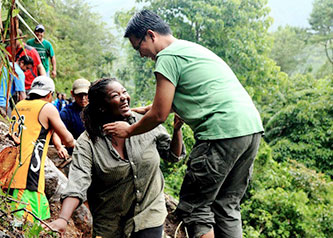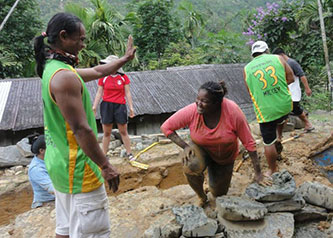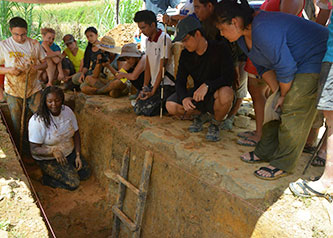Alexandra McDougle, a Moanalua High School alumna (2012) and a 2015 graduate from the Department of Anthropology in the College of Social Sciences, has been named one of the 2016 Luce Scholars. Selected from a field of approximately 175 nominees nationwide, McDougle is the first Luce Scholar nominated by UH Mānoa and is the first selectee in the program’s history with a physical anthropology background.
The Luce Scholars Program is a national fellowship program that was established in 1974 by the Henry Luce Foundation of New York City. The program identifies promising young leaders for a yearlong experience of working in Asia. It is designed to enhance the understanding of Asia among potential leaders of U.S. Society. Seventy-five top universities and colleges in the United States are invited each year to nominate up to three candidates per campus, with a total of 15 to 20 Luce Scholars selected from the pool.
McDougle was drawn by the Luce Scholar Program’s focus on developing future leaders. “By actively creating a space for women and minorities in academia, I make room for the future anthropologists and leaders who will follow me. My commitment to increasing diversity and inspiring change are in line with the Luce Foundation’s mission to bring important ideas to the center of American life and strengthening international understanding. The Luce Foundation will give me the opportunity to represent the complexities of the modern day American leader,” said McDougle.
An understanding of what constitutes a good leader is only part of what drives McDougle. She also hopes to bring her training to bear on the interplay between biology and culture, and ensure that stories are told as objectively and as honestly as possible.
Spring 2016, McDougle participated in a field experience in the island of Betio in the Republic of Kirbati with History Flight, a non-profit organization that seeks to locate and recover fallen U.S. military personnel. In June, she participated in one-week training sessions in New York and San Francisco, respectively. Upon completion of the training, she will be placed in Asia. She hopes to be placed in Vietnam and Cambodia, where the field of Southeast Asian archaeology is growing, and where she hopes she can participate in the excavation of postwar civilian remains in the “killing fields” for proper burial.
Along with this formative experience, McDougle is excited about what the Luce Scholar Program means for her. “It’s a year to go out and try new things. A year to go out and find yourself. Learning about different Asian cultures is a priority for Luce Scholars. We are encouraged to travel to other Asian countries, to experience modern day Asia and to bring these ideas to the center of American life,” she added.
Alex started volunteering on archaeological projects when she was a junior in high school. Her mom was working as an archaeologist and would bring Alex along on some of her on island excavations. During this time, Alex fell in love with the inquisitive nature of archaeology and saw it as way for her to indulge her love of asking questions with her passion for stories.
Alex’s long-term goal is to become a forensic archaeologist and investigate war crimes and violations of human rights. She works for History Flight, a NGO (non-governmental organization) that focuses on World War II MIA recovery and repatriation. In that capacity, she is part of a team of that works to recover American Soldiers who were killed and buried abroad during World War II. She is currently stationed in Kiribati and is working on the recovery for marines killed during the Battle of Tarawa. In June, Alex will head off to New York for her Luce Scholars orientation, after which she’ll be placed in Asia by the organization.


